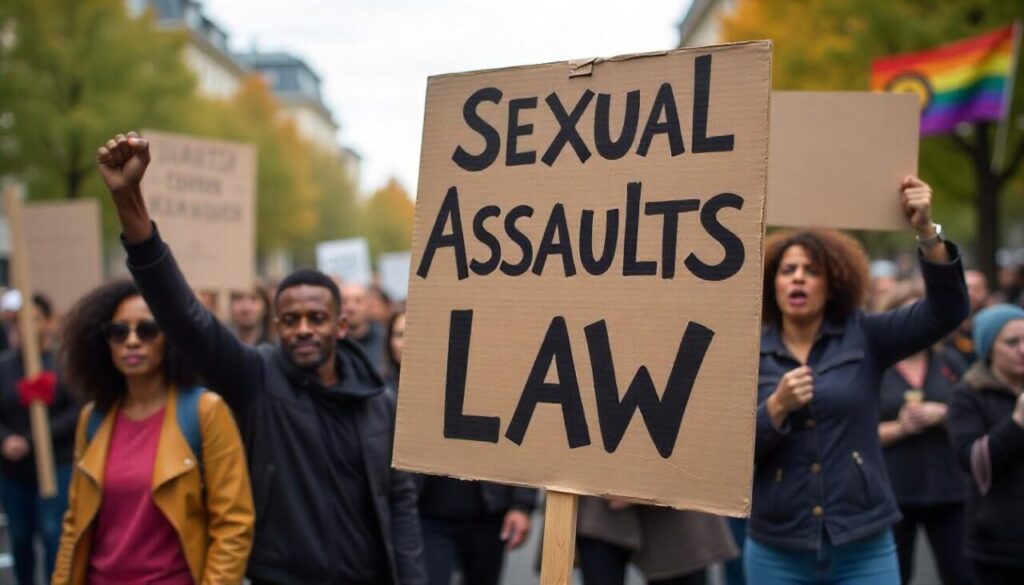
This question has always been somewhere in the back of my mind. Mostly because I sometimes like to dream that we’re all intelligent and altruistic beings who could organize themselves without the need for some written and enforced laws.
Then again, looking at how people behave, I understand that my dream is just that – a dream that cannot be fulfilled in current society. Quoting George Carlin, “Think of how stupid the average person is, and realize half of them are stupider than that,” it should be clear why we cannot have a lawless society, at least not yet (and perhaps never).
Nevertheless, let’s indulge ourselves and hypothesize how could lawless society look like and perhaps romanticize how it would look if we were all wise enough so that we don’t need laws at all.
By many popular opinions, a society without laws would be a society in a state of almost constant chaos. World without laws and government would probably look like some type of anarchy.
By the Merriam-Webster dictionary, anarchy is a state of lawlessness or political disorder due to the absence of governmental authority and rules. Life without some type of rules to control us would be a state of disorder by many opinions.
Mine included as elaborated briefly in the first paragraph. However, before going deeper into how that kind of society would look like, let’s use history as a teacher and see how laws developed in different cultures.
Interesting fact: The First "Lawyers" Were Priests - In ancient Mesopotamia, priests acted as judges and legal experts because laws were considered divinely inspired. They interpreted legal disputes as part of their sacred duties.
Murder and History of First Laws

In prehistoric times there weren’t many laws. Ancient people lived in small groups where they were defining their own laws if those could be called laws. As societies grew so the laws became more detailed, and there were more of them.
One of the basic and most important laws and rules for every society is the law about murder. In early societies, the implication of murder law was not implemented via the legal system but by blood revenge. Additionally, early societies had some forms of payment that could be made instead of blood revenge.
For example, early Germanic society had weregild (man price). It represented the possibility to repay the victim’s family instead of blood revenge. The amount of weregild was calculated by a person’s status in society. The wergild of a woman was usually equal to, and often more than, that of a man of the same class.
Then we also have early Sumerian codes and rules. Sumerian Code of Ur-Nammu represents one of the oldest codes where some kind of prohibitions against murder appears. The code states, “If a man commits a murder, that man must be killed.” Pretty simple, isn’t it.
Furthermore, in the Ten Commandments given by God to Moses, it is explicitly stated that “Thou shalt not kill.” In Islam, according to the Qur’an, one of the biggest sins is to kill another human being who has committed no fault. “For that cause, we decreed for the Children of Israel that whosoever killed a human being for other than manslaughter or corruption in the earth, it shall be as if he had killed all mankind, and whoso saveth the life of one, it shall be as if he had saved the life of all mankind.”[Quran verse 5:32]
Murder was one of the earliest “laws” passed on to society, but it wasn’t the only one. During the time, codes and laws became more detailed. Ur-Nammu, the Sumerian ruler, created the first law code that consisted of casuistic statements such as “if…then…” Then we also have the Code of Hammurabi. Probably everyone remembers that one from school. It is three centuries younger than the beforementioned Code of Ur-Nammu.

The Code of Hammurabi was probably the earliest and most complete legal code ever written. Code consisted of 282 rules. Those rules described commercial interactions and different fines and punishments. Interestingly enough, code was carved into massive, finger-shaped black stone.
Across centuries many things happened to that stone, but it was finally rediscovered in 1901. Today it resides in the Louvre Museum.
Interesting fact: Witch Trials Used Odd Evidence - During the infamous Salem Witch Trials (1692–1693), "spectral evidence" was allowed. Accusers could claim they saw a spirit or ghost of the accused performing witchcraft—no physical proof required.
Weird Laws Around the World

Those examples are only the beginnings of laws in our world, but during the course of hundreds (and thousands) years, laws started to shape every possible part of human and non-human behavior. Every aspect of society now has thousands and thousands of laws, and that is surely a good thing in one aspect.
Yet in another, some laws are rather complex, some are only there to protect and serve those who created them, and some are simply weird. The latter kinds are always the most interesting ones, so let’s just name a few:
- In Arizona, it is against the law to have a sleeping donkey in your bathtub after 7 p.m.
- It’s illegal to hike naked in Switzerland.
- It’s illegal to wear high heels to the Acropolis.
- It is illegal to chew gum in Singapore.
- Interestingly, it is illegal to drive blindfolded in Alabama (as it should be).
- If you own any chickens in Quitman, Georgia, it is illegal to let them cross the road.
- In Florida, it is illegal to pass wind in a public place after 6 p.m. on Thursdays.
- In Scotland, if someone knocks on your door and requires the use of your toilet, you must let them enter.
- In Samoa, it is illegal to forget your wife’s birthday.
- In California, it’s illegal to whistle for a lost canary before 7 a.m.
- In Colorado, it’s illegal to keep a couch on your porch.
- In Delaware, you can’t sell dog hair.
- It’s illegal to ride a cow drunk in Scotland.
- It’s illegal to wear a mask in public in Denmark (this will probably change in today’s mask madness all around the world).
- It’s illegal to swear in the U.A.E.
- It’s illegal to wear lacy undies in Russia.
- It’s unlawful to build a sandcastle in Spain.
- In Georgia, it’s illegal to live on a boat for more than 30 days.
- In Hawaii, it’s illegal to place a coin in one’s ear.
- In Illinois, it’s legal for underage culinary students to drink alcohol.
- In Indiana, it’s illegal to ride a horse above 10 Mph.
- It’s illegal to reincarnate without permission in China.
- It’s illegal to kill bigfoot in British Columbia, Canada.
- It’s illegal to pee in the ocean in Portugal.
- In Kentucky, a woman cannot marry the same man four times. Hm… Why would she?
- In Maryland, sleeveless shirts are banned in public parks.
- Worldwide in 2020, 2021 and 2022 it was illegal to breathe unobstructed air!

Ok, the last one is a joke — sort of.
So clearly, there are thousands and thousands of laws written during the course of a long history with the goal to somehow control or shape human behavior and all processes related to almost everything in the world.
And as we also determined – this is mostly good, at least with humanity at the current level of (im)maturity. So, let’s see how society would function without laws and rules.
Removing Laws?

A good place to start imagining how society would function is to remove important laws and rules such as those related to murder. Per Cornell law, murder is defined as killing another human being with malice aforethought. Malice aforethought is a legal term of art that encompasses the following types of murder: “Intent-to-kill murder,” “Grievous-bodily-harm murder” – killing someone in an attack intended to cause them grievous bodily harm.
As we know, all across the world, there are laws that basically say one should not kill another person, and if it does happen, there will be dire consequences. So, if we remove those dire consequences written in different laws, well, then we would have big problems on the streets almost immediately. Therefore, let’s imagine what would happen if only 1 law (about murder) is cancelled:
- Day 1 – Governments around the world remove all laws related to murder.
- Day 2 – A lot of people around the world start killing other people as there are no consequences anymore. What do I mean by “a lot”? Well, according to some estimates, psychopathy is found in about one percent of the general population, and for reasons that are poorly understood, most psychopaths are male. Now, not all psychopaths are criminals, and not all psychopaths will have the urge to kill someone. However, in these circumstances where there are no consequences for killing, we can freely guess that some normal people would also do the bad deed either for revenge, for food, or for whatever other reason. So, we can play with numbers, but I would say that 1 percent of people who would immediately start killing is an understatement but let’s go with it. Having said that, with a current human population of 7,8 Billion, we would have 78 000 000 (78 million) people wandering around looking for someone to kill.
- Day 3 – All-around chaos is on the streets. Rich people are going in bunkers.
- Day 4 – Army is being sent on the streets. Every country is approaching civil war.
- Day 5 – People stop working or going to work as they are afraid.
- Day 6 – Shortage of guns and ammunition in gun stores.
- Day 7 – Normal people are doing everything they can to secure their homes. Meaning they get aggressive and full of arms too.
- Day 8 – Complete anarchy.
And so on, and so on…
Sexual Assaults Laws

Perchance I am exaggerating, but perhaps I am not. Possibly the consequences would be even more dreadful and happen even more quickly. Remember, this is by removing only one law. Of course, this is one of the most important laws but, nevertheless. In that case, let’s imagine what would happen if we, for example, remove laws related to sexual assaults? The collapse of society could happen even more quickly.
Keep in mind, humans are sexual beings (for now…see post about Sex Robots and Humanity), and while this is terrific because of all the pleasure sexuality gives us, some people cannot really control their voluptuous desires. And the only thing that is keeping some people from committing different sexual assaults are laws that will put them in prison for life if they decide to be “nasty.” Based on that predicament, let’s look at some of the current statistics where laws and punishments are still present and valid:
- Per National Sexual Violence Resource Center, nearly 1 in 5 women (18.3%) and 1 in 71 men (1.4%) in the United States have been raped at some time in their lives, including completed forced penetration, attempted forced penetration, or alcohol/drug-facilitated completed penetration.
- A United Nations statistical report compiled from government sources revealed that more than 250,000 cases of rape or attempted rape were recorded by police annually. The reported data covered 65 countries. This report did not include South Africa having 50,000 rapes per year or some other countries with high rape statistics, such as Egypt.
- Per data from Unwoman.org, at least 155 countries have passed laws on domestic violence, and 140 have laws on sexual harassment in the workplace. However, even when laws exist, this does not mean they are always compliant with international standards and recommendations or are implemented and enforced.
- CDC data shows that approximately 1 in 21 men (4.8%) reported that they were made to penetrate someone else during their lifetime; most men who were made to penetrate someone else reported that the perpetrator was either an intimate partner (44.8%) or an acquaintance (44.7%).
- An estimated 13% of women and 6% of men have experienced sexual coercion in their lifetime (i.e., unwanted sexual penetration after being pressured in a nonphysical way); and 27.2% of women and 11.7% of men have experienced unwanted sexual contact.
- Most female victims of completed rape (79.6%) experienced their first rape before the age of 25; 42.2% experienced their first completed rape before the age of 18 years.
- More than one-quarter of male victims of completed rape (27.8%) experienced their first rape when they were ten years of age or younger.
- SecureSisters.org estimates that 531,810 people were raped (threatened, attempted, or completed) in the United States in 2022.
- Per US National sexual violence resource center, approximately 1 in 6 women (16.1% or an estimated 19.2 million women) and approximately 1 in 10 men (9.6% or an estimated 10.6 million men) experienced sexual coercion (e.g., being worn down by someone who repeatedly asked for sex, sexual pressure due to someone using their influence or authority) at some point in their lifetime.
There could be materials on this kind of statistics for dozens of books; however, I just wanted to make a point that even though there are thorough laws and punishments with regards to any kinds of sexual assaults, they are still happening. And not in small numbers but in millions.
Now imagine how much that number would grow without laws. One thing is for sure – a woman walking on the street would not feel safe. Of course, many, many people would behave the same with or without laws, and they would help any victim but believe me, there would be so many people raping anything and anyone they could find. All day, every day. That would completely destabilize society.
So, we’re back to square one as we were with murder law abolishment. That is – complete anarchy on the streets and probably destruction of current society. At least in the first few years. Or decades, probably. I mean, possibly in 30-50 years, people would find ways of behaving without written laws.
By that, I don’t mean that people would suddenly improve enough and become new Buddhas since for that, we would need hundreds and hundreds of years of a completely different set of values.
Interesting fact: Speeding Fines Adjusted to Income: In Finland, speeding fines are based on your income. In 2002, a wealthy man was fined over $100,000 for speeding, as the penalty was calculated as a percentage of his annual income.
Lawless Society
Then again, some laws, if removed, would benefit society instantly. Think about taxation laws. Sure, some ways of the government collecting money for public services is needed; however, in many cases, those taxes and means of government using their citizens as sheep who constantly pay money are simply too big.
Additionally, many different economic laws, if changed or completely abolished, could benefit society instantly and especially those in need. Many laws are being passed because of lobbying or special interests for the most influential people and entities. Almost never for the poor ones or for average Joe’s. T
hus, abolishing those laws that only contribute to rich becoming even more rich and poor becoming poorer would profoundly benefit society, especially in a couple of years or decades.
Also, there are laws that are simply absurd in many countries and need to be changed promptly because they serve no one, and in most cases, they actually oppress people. Without those laws, society would live better for sure.
Let’s just name a few:
- Iran’s Dress Code
Almost everyone is somehow familiar with this one. This law basically does not allow women to appear in public without Islamic dress (hijab). And if some woman decides to do the opposite, then she risks imprisonment or a fine. This law really doesn’t make any sense, and more and more women in Iran are against it. Especially since there is no such law imposed upon men, so it is by itself discriminatory.
- Ban on women driving in Saudi Arabia
Now, this is a really silly ban, and it’s not even a law, but it somehow functions like one. Namely, the Saudi government restricts women from driving by imposing a ban on granting them driving licenses. This ban has many negative consequences for women as it limits their travel and freedom in several ways.
- Uganda’s “Miniskirt Law”
Ugandan government in 2014 signed controversial “antipornography” legislation which basically outlaws miniskirts. This very strange law describes what kind of clothes are revealing too much and thus restricts women from wearing them in public. Ethics and Integrity Minister Simon Lokodo stated:
“If you dress in such a way that you irritate the mind and excite the people, then you are badly dressed; if you draw the attention of the other person outside there with a malicious purpose of exciting and stimulating him or her into sex.”
Again, these kinds of statements and laws limit independence for women in many ways, and it shows how freedoms can also regress in modern times. It is simply amazing how stupid people can be with their behaviours and their laws. Remember that those laws are not just written down one day, and that’s that. No. People went into meetings, they had discussions, and then they potentially agreed.
Then someone needed to write that down and pass it to congress (depending on the country, of course). Many activities and processes need to happen before any law is passed. So, it is unbelievable that someone would go into such trouble to write a law about miniskirts for women.
What is the purpose here? Why would someone even think about it? It is complete insanity, and it is only one example out of hundreds.
Society needs to think about progressing and making laws that would enable progression. Some laws clearly need to be abolished, some need to be changed, and some will need to stay with us almost forever because people are not yet ready to live without rules since the majority is not yet in that state of (mind) development.
A perfect society with a different set of values and different human behaviour could potentially live without rules and laws, but we’re not even close to that level as humanity.
Perhaps in thousands of years, when we understand what is important in life and how not to behave, then we could change societies from law-abiding citizens to conscious and wise citizens.




























